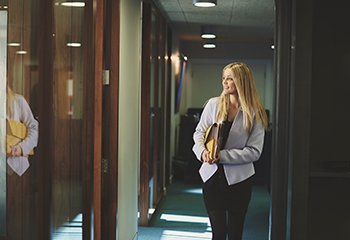
The fourth industrial revolution #4IR is already underway and like the industrial revolutions before it, it will instil fundamental change in all aspects of our personal and professional lives. Change can be a scary thing and many of us will feel reluctant to embrace it – but it’s important that we do.
It is even more crucial still, that the next generation are ready and equipped with the skills they need to navigate the change themselves. School is where we are prepared for our adult life, and for the young people of today their adult life will become ever more dominated by technology. As such, it is our responsibility to introduce them to this environment from as young as possible to best equip them for the future they will be likely to inhabit.
 Virtual Learning Environments (VLEs) provide a strong digital infrastructure for the classroom, that allows students to familiarise themselves with a professional digital environment; it also has the potential to take the onerous administrative tasks off of teachers’ plates and enables flexible personalised teaching methods to be deployed. In a society that is rapidly changing around us, this adaptability is vital in delivering an up to date and holistic educational experience.
Virtual Learning Environments (VLEs) provide a strong digital infrastructure for the classroom, that allows students to familiarise themselves with a professional digital environment; it also has the potential to take the onerous administrative tasks off of teachers’ plates and enables flexible personalised teaching methods to be deployed. In a society that is rapidly changing around us, this adaptability is vital in delivering an up to date and holistic educational experience.
"Virtual Learning Environments (VLEs) provide a strong digital infrastructure for the classroom"Becki Lee, Hopwood Hall College
Modernising the classroom
VLEs are inherently adaptive, allowing for experimentation and fluidity when it comes to testing what teaching style suits your classroom best. At Hopwood Hall we have been able to implement a number of different teaching methods such as flipped learning and blended learning, allowing classroom time to be allocated more effectively, so students leave their lessons with a greater understanding of the subject. For example, with flipped learning, students can be assigned a topic to research prior to the lesson, the VLE then provides a space for them to discuss, record and share ideas as well as their work. This means classroom time is saved for expanding their knowledge of the topic and sounding out any difficulties they may have had with the learning materials. This allows students to leave class feeling more confident about their understanding of the topic. It also helps support students of varying abilities, as the teacher has the chance to provide the necessary one on ones that may be required, given that they are no longer tied into the traditional lecture style lessons.
Moreover, with classroom sizes growing, it is becoming increasingly harder for schools to cater to each individual student need. VLEs track each student’s progress and provide detailed reports for the teacher. This allows for more personalised teaching methods, which is better for the students and helps give the teacher an insight into areas that a learner may need more input or support with. This can help prevent students falling behind, as teachers can target their time effectively, turning the modern classroom into a place that can cater to every student personally and supportively – in a way that helps them achieve their very best.
Addressing the burden on teachers
A great deal of teachers’ time is weighed down in burdensome administrative tasks or classroom preparation. At a time where teachers are already overstretched it is vital that every effort is employed to support them in the classroom. VLEs help reduce the time teachers spend on class preparation and the time spent on monitoring and recording progress, as this is all done by the system itself. However, it must be noted that it does take time initially to upskill staff, but this is beneficial in the long term as it is a skill that teachers can take forward with them throughout their careers, and saves time further down the line.
For us, at Hopwood Hall we found that employing a dedicated team of digital professionals, all with backgrounds in education, has helped support teachers and allowed for ongoing training that prevents them from feeling overwhelmed by the changes. This has also allowed us to provide short courses in digital upskilling for those outside of the college, creating a positive relationship with the community around us as well as with our staff and students. It can also play a role in staff and student wellbeing, we have areas within our VLE dedicated to health, mental health, academic support study skills – enabling extra support that might have not been a possibility previously.
Furthermore, the type of VLE you incorporate is important. Using an intuitive platform such as itslearning has really helped us adapt to the new digital system. VLEs must be simple to use; integrating a complex system that requires extensive upskilling is entirely counter intuitive to the purpose it aims to serve. Well-designed VLEs will aim to be as accessible and intuitive as possible for all their users. We are also about to host our third event on building digital skills for the future; the last two have attracted over 100 delegates across the UK and Ireland. These types of events allow for ideas sharing between those in the education sector, helping ensure that schools are adopting these new systems responsibly and with all the support they need to effectively implement it.

VLEs can also be utilised to help with continuing professional development (CPD) and training. At Hopwood Hall we even do some of our mandatory training such as mental health awareness, fire safety, GDPR and more, as online modules. This has reduced pressure on staff and costs for the college, plus it ensures all staff are current and up to date with all the requirements, and can access the training at a time that suits them rather than trying to get everyone to attend set slots.
Preparing students for their future
Familiarising students with technology in the classroom will help foster a responsible and comprehensive understanding of the role digital tools play in professional settings; giving young people the best chance of fulfilling their employment aspirations in the future. The need for digital capabilities is increasing across most sectors and professions and it is therefore vital that students leave education feeling comfortable that they are equipped with the digital capabilities they will need to progress.
Immersing students in digital technology ensures that they gain a level of digital fluency that they would not otherwise be guaranteed. It also helps bolster additional skills that they will require in their professional lives such as self-management and independent learning; as VLEs require students to take a certain level of responsibility for their education into their own hands. These are vital abilities in any workplace setting and are beneficial for the individual’s personal lives also.
Additionally, digital learning environments can be an important way to engage young people, as many will be more accustomed to using online and digital devices in their day to day lives than any other tools. Therefore, by utilising methods that students themselves use, you are creating a learning environment that is more relevant to them and more conducive to effective study.
Technology is inevitably going to permeate every sector, including that of education, and so the important factor is how we allow that to happen. For Hopwood Hall, embracing an extensive VLE has helped significantly improve our educational offering. The UK government has also recently recognised the important role technology can play in education with their new digital education strategy, ‘Realising the potential of technology in education: A strategy for education providers and the technology industry’. Clearly, indicating that education technology is only going to become more integral to the British education sector. Ultimately, this is a step in the right direction as VLEs have the ability to relieve some of the greater problems that lie at the heart of the education sector currently. Certainly, we have seen how effective these digital solutions can be at Hopwood Hall.
